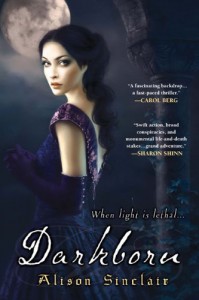Darkborn
 This is a cross between urban fantasy and mannerpunk, likely to move into epic fantasy in the sequels. By which I mean it mixes action scenes and captures/escapes/rescues with formal social encounters and an adherence to societal norms, all of it with a potential Ultimate Evil brewing in the background. My thoughts on all aspects of the book are mixed, so I'll take them one at a time.
This is a cross between urban fantasy and mannerpunk, likely to move into epic fantasy in the sequels. By which I mean it mixes action scenes and captures/escapes/rescues with formal social encounters and an adherence to societal norms, all of it with a potential Ultimate Evil brewing in the background. My thoughts on all aspects of the book are mixed, so I'll take them one at a time.The Worldbuilding: This book's novelty is primarily in its world, divided into two societies, Darkborn and Lightborn. The Darkborn are blind, use sonar ("sonn"), and burn to death in sunlight, while the Lightborn are sighted and dissolve in darkness. Though they share cities, the two groups can never come face-to-face, and each has its own rulers and social norms. This book focuses exclusively on the Darkborn, rather than introducing us to two societies at once, and that works well, especially since they are the stranger and more interesting race.
The world's limitations make for great narrative potential: the Darkborn can't step outdoors in daytime on pain of death, no matter the extremity, whether medical emergency, house fire, crime, natural disaster, the list goes on. It's quite an obstacle to normal life as well. Now if you are already thinking, "why don't these people just live underground, or at least build sealed walkways in urban areas?" you are thinking more critically about this premise than I did - until the author waved the holes like a matador before a bull, that is. As one character offhandedly informs us, the Darkborn in the city where our story takes place once had tunnels, but bricked them up after the Lightborn made the streets safe for their use at night (presumably by sealing their windows). So, somehow we are supposed to believe that these people are capable of discovering electricity, inventing the steam engine, and various other mechanical and engineering feats, but are so stupid as to destroy their 24/7 safe passageways in favor of roads whose use entails instant immolation approximately 12 hours out of the day? I want to give the entire race a Darwin Award.
Moving on, the Darkborns' other notable attribute is their blindness. So social norms have built up around the use of sonn, and meanwhile I was surprised by how little I noticed that nothing is described in color. However, while sonn is limited in range and has to be "cast," otherwise it reads like vision; characters are capable of perceiving details like facial expressions, scars, and the material and cut of clothing, which seems a bit unlikely and unimaginative.
The Characters: Unusually for fantasy, two of our three protagonists, Balthasar and Telmaine, are a happily married couple with two young children. (By coincidence, this is not the first such fantasy book I've read in the last few months; the other is [b:Dragonsbane|176268|Dragonsbane (Winterlands #1)|Barbara Hambly|https://d.gr-assets.com/books/1315278923s/176268.jpg|170350], which I'd recommend over this one.) Balthasar is a gentle doctor and scholar, while Telmaine is a socialite from a noble family who married down, at least in the eyes of her family and friends. Unfortunately (at least to me), this setup does not prevent the book from containing a whirlwind romance subplot and a love triangle: enter Ishmael, our standard-issue grizzled warrior with a tragic past (yawn). Fortunately, Balthasar and Telmaine both handle their spouse having a crush outside the marriage like adults.
Of the three protagonists, Telmaine is the most prominent (and the only one to reappear in book two), and the most controversial among readers. My response is ambivalent. On the one hand, she is a dynamic character in the process of unlearning the prejudices of her society, and by taking an active role and succeeding dramatically at key moments, she makes a good heroine. On the other, she has quite the sense of entitlement, seen particularly in her secretly reading the minds of those closest to her and covertly learning their darkest secrets, without apparently considering the violation of their privacy and autonomy. Also, the author seems to want to prove that Telmaine is Not Like Other Women (at least in society) despite, or perhaps because of, the fact that she actually is traditionally feminine. Which just makes it look like she surrounds herself with vapid and small-minded people who obsess over trivial breaches of etiquette. Fortunately the book also includes some interesting women outside of high society; by far my favorite character is the mage doctor Olivede.
The Plot: Entertaining, despite a few clichés and the characters' constant repetition of their story to every new person they meet. The plot moves quickly without subsuming character development or worldbuilding, and the author allows us to figure out the world as we go. This book isn't quite standalone; while it ends at a logical point, it's a breather rather than a resolution. But it did keep my attention and provide enjoyable reading.
And despite all my reservations, and the fact that I am not a big fan of sequels in general, I've moved on to the second book, so in the end this one did its job. The writing is smooth if occasionally over-the-top, the characters are believable if not especially deep, and it's a good fast read. If nothing else, it makes for fun escapism.





